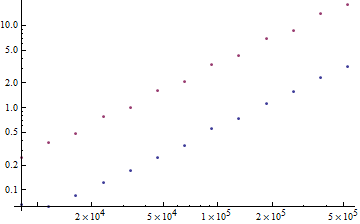When we don't know the number of results that will be generated, the usual way to collect results is Reap/Sow. Another alternative is linked lists. Neither of these are available in compiled functions.
AppendTo does work, but it has an $O(n^2)$ complexity, so it will be unacceptably slow for long result lists.
There was a very clever suggestion to use Internal`Bag in these situations:
Unfortunately a compiled Bag will only hold scalars. Let's try to use vectors:
cf = Compile[{},
Module[{bag = Internal`Bag[{{0, 0, 0}}]},
Do[Internal`StuffBag[bag, {i, i, i}], {i, {1, 2, 3}}];
Internal`BagPart[bag, All]
]]
CompilePrint shows that this calls MainEvaluate, so this does not work.
What is the best way to collect a large number of results in a compiled function when the number of results is not known before the computation and the result type is not a (fixed size) vector or matrix?
Benchmarking the answers
Andy's answer
cf = Compile[{len}, Module[{bag = Internal`Bag[Most[{0}]]}, Do[Internal`StuffBag[bag, {i, i, i}, 1], {i, len}]; Partition[Internal`BagPart[bag, All], 3] ] ]; Do[cf[500000], {100}]; // Timing (* ==> {2.87, Null} *)I needed to initialize the
Bagusingbag = Internal`Bag[Most[{0}]]to letCompileknow that it is holding integers, not reals (see here).Leonid's answer
cf2 = Compile[{len}, Module[{arr, lim, ctr}, arr = ConstantArray[{0, 0, 0}, 10]; lim = Length[arr]; ctr = 1; Do[ If[ctr == lim, arr = Join[arr, Table[{0, 0, 0}, {lim}]]; lim = Length[arr]]; arr[[ctr++]] = {i, i, i}, {i, len} ]; Take[arr, ctr - 1] ] ]; Do[cf2[500000], {100}]; // Timing (* ==> {16.474, Null} *)
Comparing the computational complexity of the two solutions by direct measurement:
data = Table[
{Round[2^k], First@AbsoluteTiming@Do[cf[Round[2^k]], {100}]},
{k, 13, 19, 1/2}];
data2 = Table[
{Round[2^k], First@AbsoluteTiming@Do[cf2[Round[2^k]], {100}]},
{k, 13, 19, 1/2}];
ListLogLogPlot[{data, data2}]

(They're the same.)

cf2performs poorly is that it is not completely compiled. There is still a call toMainEvaluate. $\endgroup$